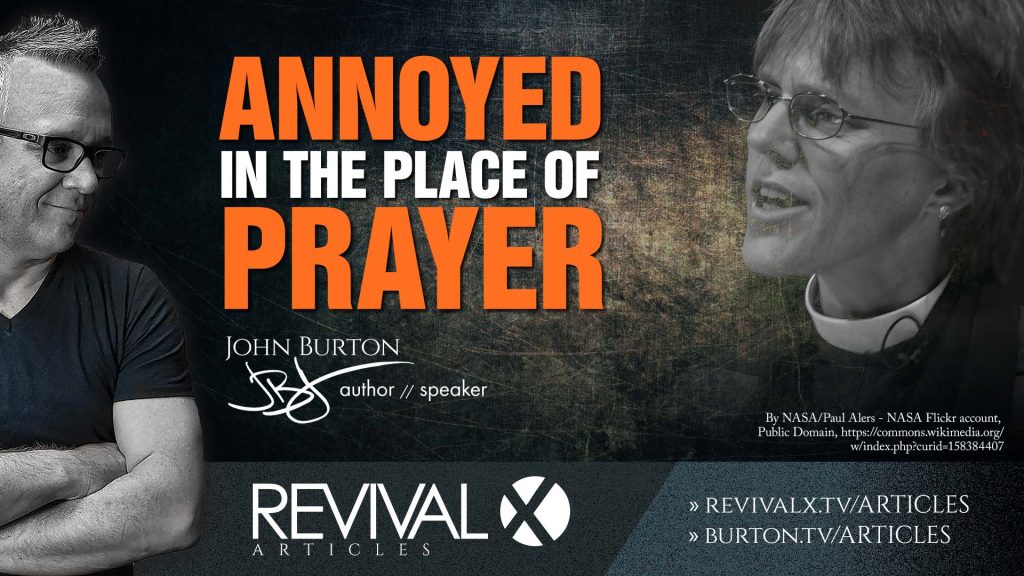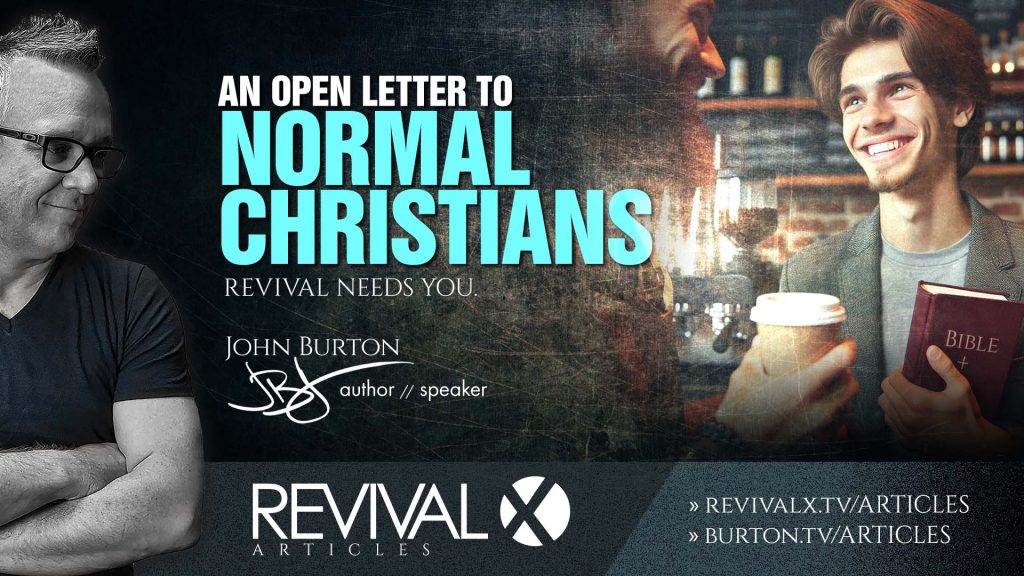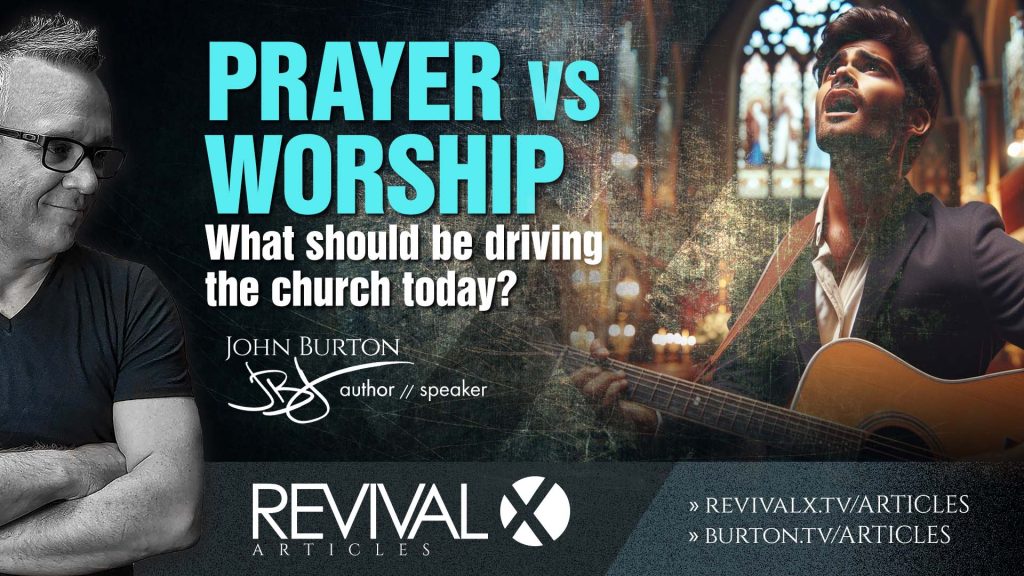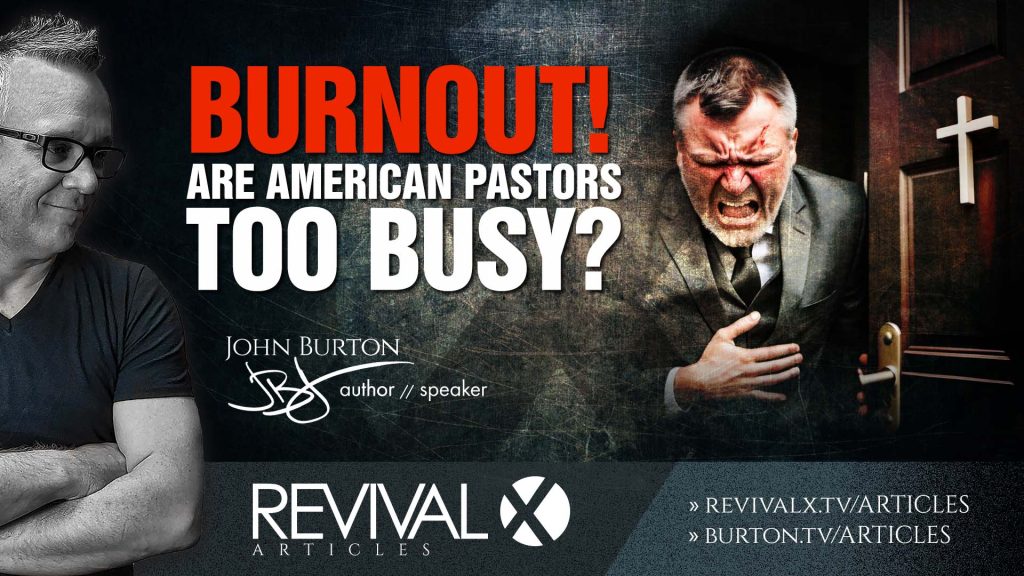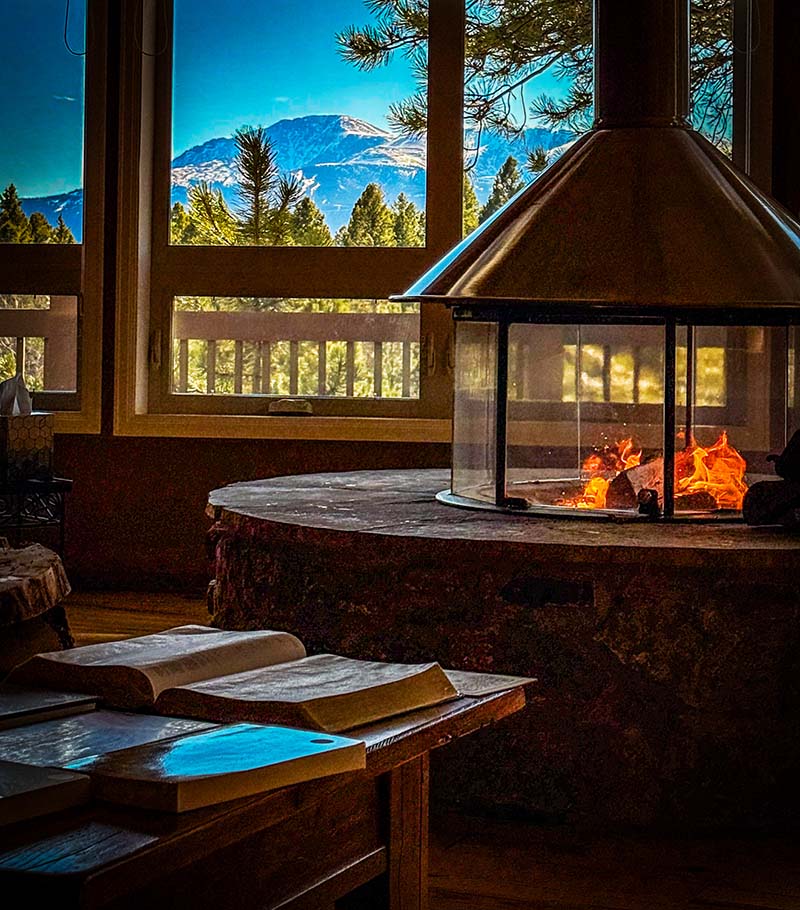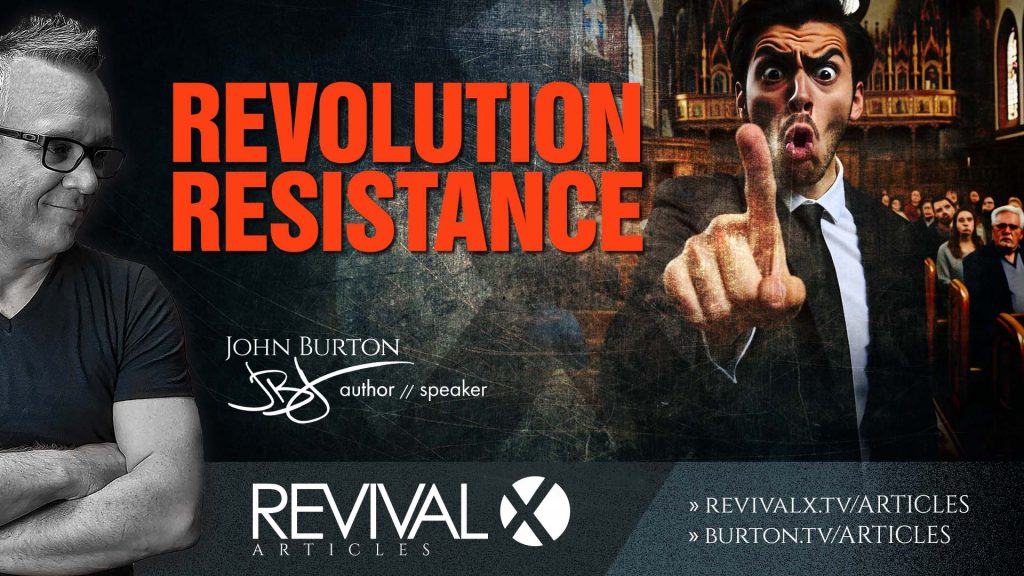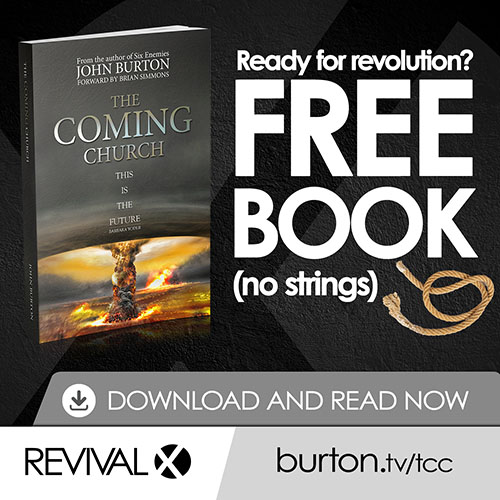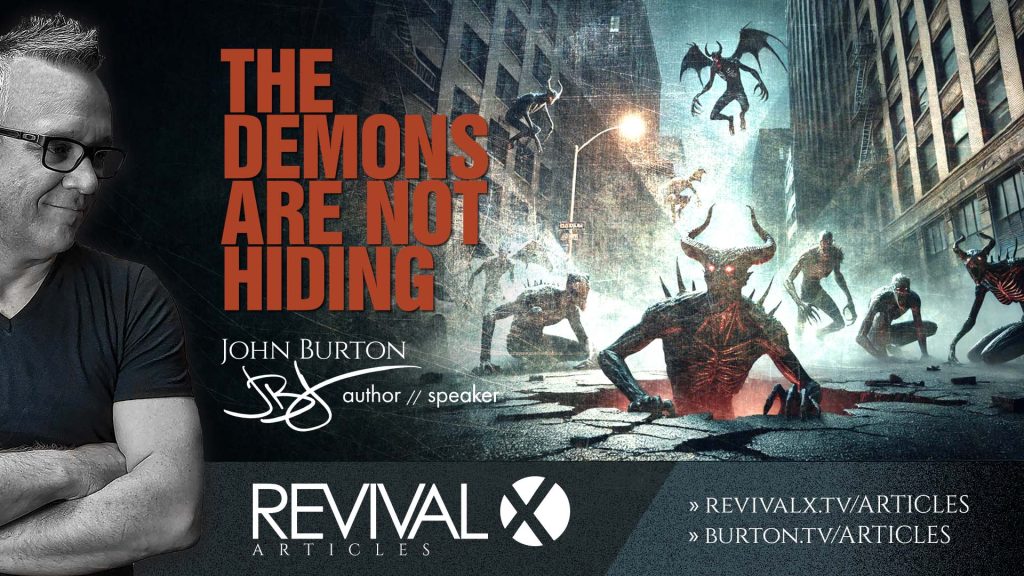The Church
Annoyed in the Place of Prayer
It's not the words Bishop Mariann Budde spoke.
“In the name of our God, I ask you to have mercy upon the people in our country who are scared now.”
“I ask you to have mercy, Mr. President, on those in our communities whose children fear that their parents will be taken away.”
“May God grant us the strength and courage to honor the dignity of every human being…”
These are direct quotes from the message that Bishop Mariann Budde released to the nation at the inaugural prayer service. It's hard to argue with the words, which, I'm sure, were carefully poured over and selected. Mercy, strength, courage, honor, dignity. All good things.
THERE'S MORE THAN WORDS TO BE EVALUATED
While it's true that some campaigning Christians are creating unnecessary division with rants and accusations, there are others who are celebrating the Bishop's rallying cry as heroic and undeniably “Christian.” The divide within the church is wide.
Those who are leaning left predictably do not discern the spirit behind the words. I've watched many previous radicals for Jesus become disillusioned by the church. It's terribly grieving to see people who were champions for holiness fall for the religious deception of the day. Grieving, but not shocking.
What has shaken me is the number of authentic lovers of Jesus actually buying into what Bishop Budde is selling. I'm stunned. They are actually supporting her message.
More than any time in history, we need the gift of discerning of spirits in the church. Many false-teachers will arise with convincing words in their mouths. The Anti-Christ himself will be seductive, brilliant, charismatic and full of words that will appease many of the most spiritual among us.
GREATLY ANNOYED IN THE PLACE OF PRAYER
This message by Bishop Budde was filled with “true words” and delivered in the place of prayer. After reading the following passage of Scripture, you can't deny the irony.
“As we were going to the place of prayer, we were met by a slave girl who had a spirit of divination and brought her owners much gain by fortune-telling. She followed Paul and us, crying out, “These men are servants of the Most High God, who proclaim to you the way of salvation.” And this she kept doing for many days. Paul, having become greatly annoyed, turned and said to the spirit, “I command you in the name of Jesus Christ to come out of her.” And it came out that very hour.” (Acts 16:16–18, ESV)
The slave girl was driven by a spirit that benefited many. Lies weren't being spewed. In fact, the truth she shouted was clear and powerful. Then why was Paul greatly annoyed?
It wasn't the message that bothered him. It was the spirit. It was the agenda. It was the defiance.
Today's authentic, Spirit-filled Christian nation is annoyed at the wicked spirit that was catapulted into our country. The prayer service was desecrated and curses, intentional or not, were released.
The passage in Acts continues by revealing what happens when the Spirit of truth confronts, delivers and dares violate the agenda of the religious. Attacks. Beatings. Imprisonment.
Oh, and keep reading a little further and you'll see:
“About midnight Paul and Silas were praying and singing hymns to God, and the prisoners were listening to them, and suddenly there was a great earthquake, so that the foundations of the prison were shaken. And immediately all the doors were opened, and everyone’s bonds were unfastened.” (Acts 16:25–26, ESV)
FALSE LOVE
Many on the religious left are crying out with a message of supposed love, though their definition doesn't pass muster when compared with Scripture.
From my article, The Great Love Deception:
Keep in mind that false or tainted love doesn’t flow mostly from an evil, debased heart. It also doesn’t mean that there is nothing about the argument or viewpoint that is true. A person who craves pure love can, in their zeal or in their weakness, allow impurities into their expression of love that twists and compromises it. The reason I needed to say this is to encourage you if you’ve been hit by the false-love spirit. Your desire for manifested love is very probably true, yet the enemy can come in and confuse the process.
The inaugural prayer sermon feels like love, and many of the points can be accepted as true. However, the deconstructed and the liberals most often fail to understand what true, biblical love looks like.
It has to be said, without any nefarious motive or ill intent, that Bishop Budde endorses a heretical message and is a leader in a heretical movement, the Episcopal Church. She cannot be considered a sister in the Lord. This is enough to raise red flags regarding her sermon.
While I'm confident she has many impressive and honorable traits, that's not enough to pass the scriptural litmus test. Many of society's nicest, most honorable, kind and caring people are not believers in Jesus and his truths.
Yes, the unsaved can at times be kinder than the saved. That's a sad indictment on the church. That being said, it doesn't exonerate those who endorse and spread heresy. Their message is eternally deadly.
THE ANOINTING MATTERS
No Spirit-filled Christian would believe Bishop Budde's message carried the anointing of the Holy Spirit. It did not.
It was fueled by agenda, erroneous beliefs and human wisdom that was wrapped in the guise of love.
This doesn't mean we hate, despise, shame or seek her destruction. God loves her passionately, just as he loves those she referenced in her message.
It's time for the church to exhibit true love that cannot be counterfeited by those who do not know God. It won't always affirm, appease, tolerate or include, but it does reveal the burning passion of Jesus for mankind.
An Open Letter to Normal Christians
Delay is no longer an option.
The term normal Christians is in no way meant to be disparaging. It's defining.
For the sake of this letter, a normal Christian would be someone who faithfully connects in a church, develops life-giving relationships with other Believers, gives joyfully, loves to worship and has a desire to grow in their relationship with Jesus.
Further, they may be in the Spirit-filled camp or may align with any number of additional authentic, Christian expressions. These are people many would consider the spiritual backbone of society. Some may be candidates to serve as elders, Sunday School teachers, small group leaders and pastors. This healthy, vibrant church crowd has a significant measure of devotion, or at least wild curiosity.
However, such a devotion to their “Jesus experience” isn't enough. This is the purpose of this letter.
YOU WERE BORN FOR MORE THAN THIS
There's a difference between our personal journey and our ministry. Now is the time for ministry. Revival needs you.
We are on a rescue mission to save multitudes from the torments of Hell. When this is what drives us, it becomes quite clear, quite fast, that personal edification and satisfaction once or twice a week won't suffice.
The experience God has for all of us eclipses the “church as usual” paradigm that nearly every Christian is familiar with today. A massive, all-encompassing reformation, a radical revolution, is required.
Revival is not a meeting under a tent and it's not a pie-in-the-sky dream. Revival defined is simply biblical normalcy. When we are living a biblically normal life, the fireworks start exploding all around.
You weren't born to stop short at a church commitment, bedtime prayers and a nice, safe, Christian life. Simply, you weren't created to be normal.
THE SIN OF BEING AVERAGE
In this hour when normal, average Christianity will compromise the advance of revival and the salvation of millions, I must challenge you to radically, comprehensively reconsider your spiritual life. Everything must change.
Satisfaction with the present is fatal to the future. ~Glen Berteau
While the church you attend might not be ready to cater to the hungry, desperate remnant, you have no choice but to join the ranks of the radicals. Burn hot, contend in fervent intercession, discover your spiritual gifts, shift atmospheres and unite with a Gideon's army to route the enemy and call down fire from Heaven!
THE CALL OF ALL
Again, this letter is being written to normal Christians. It's time to awaken the Jesus freak within and live a life worthy of a bloody cross and an empty grave.
It's time to lay down the dream of finding a happy church experience where the baristas know your name. The call of all in this desperate and glorious hour is to die to self, take up our cross and burn with Holy Spirit fire. No longer can we be satisfied with lesser things. The deep is calling and we must respond.
If your church doesn't provide the opportunity to rage on fire like this, then, don't jump ship. Stay faithfully connected while you add to your weekly schedule prayer meetings, prophetic gatherings and city-focused missions. Find a tribe that will not stop until full-blown revival, reformation and revolution strikes your city.
GET COMFORTABLE BEING UNCOMFORTABLE
Ben Johnson, the new Head Coach of the Chicago Bears, announced to his team, without apology, that they must get comfortable being uncomfortable.
For too long the church has been about us. Our experience, our satisfaction, our enjoyment, our promotion, our ministry, our connection, our growth. A shocking shift that's coming to the church is a disruptive departure from the tired, powerless norms of the previous generations. The remnant must arise and the focus now becomes an outpouring of the Holy Spirit in the region.
The only way to see this come to pass is if we cancel the “sail away party” on the cruise ship and enlist on the battleship. You are a soldier not a tourist. You're on a mission, not on vacation.
No longer is the church to meet our demands and expectations. We are there to meet the demands of the mission. Blood, sweat and tears will flow as we pray continually, walk in the spirit, burn white hot and run toward a fulfilled assignment.
THE BLUEPRINT
The severity of the season demands all hands are on deck and ready for war.
Instead of Ted Talk-style encouraging nuggets of truth to help us get through the upcoming week, pulpits must erupt with prophetic revelation as anointed men and women of God equip the saints for battle. The goal isn't to alleviate stress. It's to become specialists, Navy Seals, Green Berets, people who have the skills, devotion and passion necessary to look wickedness in the face and blast the light of Jesus into dark, demonized territories.
This means we must gather frequently, pray strategically, grow in the prophetic, understand our authority and advance in our supernatural superpowers. This type of life starts on our own, in our prayer closets, but it can't end there. The corporate assault necessary against the kingdom of darkness requires a unified advance. This is why this letter is so critical. You can't be normal. You can't be average. You can't do it alone. You are needed in the war room and on the front lines.
So, all who are living a predictable, typical, normal, average, tired life that looks no different than the way most every other normal Christian is living, pray for shift.
A mighty shockwave will indeed impact you, shaking you off your feet and driving you to your knees. If God is to manifest today, we cannot remain the same. Today's church shows little blood, bruises, tears or desperation as a result of the cross they supposedly carry. Most don't even bear a single splinter.
You were called to be different.
5 Ways Pastor-Led Churches Hinder Revival
Reformation of systems and structures must come if we hope to host revival.
Listen to the podcast:
I've spent years traveling to churches all over the nation and have been blessed to get to know some incredible pastors. They are hungry for revival and are willing to allow God to move any way necessary.
It's also true that many who hold the office of Pastor either unwittingly or intentionally disrupt the pursuit of revival in their city. They simply aren't gifted or wired to understand the demands of revival much less the strategy to launch and sustain it.
I strongly believe we must embrace a shift away from pastor-led churches as apostolic and prophetic leaders advance the city-church toward an outpouring. The systems and structures must change dramatically allowing those with the gift of shepherding to eliminate the burdens of senior leadership.
What follows is a general analysis of the status of the church. By no means do I presume every pastor fits into this mold, but the definition and design of this spiritual office has its limits. Every biblical office and gift does. This is why reorganization is necessary as the entirety of the five-fold ministry begins to function together.
5 Ways Pastor-Led Churches Hinder Revival
ONE: They promote comfort over crucifixion
Those with a strong, dominant pastoral gifting with a mercy gift to match are keenly focused on protecting the flock. They easily tap into the hearts of the people they care for and typically desire to remove any sense of danger or discomfort.
Pastors are absolutely brilliant when functioning as nurturing shepherds. They are at their best when imparting into people one-on-one or in small groups. However, as apostolic catalysts for revival, their weaknesses become clear.
Instead of unapologetically calling people to “come and die”, their rallying cry is often to “come and find life.” Of course, abundant life is a clear benefit for every Believer, and there are countless other truths that reveal the joy, peace, freedom and wonder of a life in Jesus. These truths must be preached.
The problem is that advance toward revival is one that requires all who sign up to surrender as martyrs. The cost is extreme and the discomfort intense. A “happy family” style church gathering just won't cut it.
TWO: They are resistant to change
Pastors know that most people find comfort in consistency. A volatile, ever-changing church culture disrupts the peace and predictability that attracts increasingly stressed-out people.
The counsel is to steer a church like a cruise ship, not a speed boat. No quick turns or abrupt jolts. Many pastors will take several years to work into significant changes. Unfortunately, revival can't wait that long.
True apostle and prophet-led churches may introduce major transitions several times a year. Week to week the focus can dramatically change.
It's common to move from unplanned seasons of deliverance to strategic intercession to mass repentance—all in the same month. The activity of the Holy Spirit, prophetic revelation, attacks of the enemy and other happenings demand quick reflexes.
THREE: They lack an apostolic viewpoint
There are many leaders who are hybrids. Pastor/apostle, pastor/teacher, etc. However, those who are solely pastoral often have a difficult time grasping the ministry of apostles and prophets. As a result, their church is usually devoid of these influences.
Further, their daily focus is not the city. It's their own local church. This may be one of the greatest hindrances to revival due to the regional nature of outpourings. People who are pursuing revival in their own local context don't understand that God's eyes are on the city. In Scripture the church is not defined by street corner. It's defined by the city or region.
Advance toward revival absolutely demands that we mostly focus on the area outside the walls of our church. This tends to be difficult for pastors as their hearts are more connected to the people close to them than the multitudes beyond their reach. Apostles tend to come at it from the opposite direction. They see over the horizon and have a passion to equip a few carefully selected firebrands for the mission.
FOUR: They avoid alienating people
Apostles and prophets are eager to take the Gideon approach, eliminating 99% of those who are unready or unwilling, and advance with the remnant, the one percent who are willing to respond with precision.
Such an approach terrifies many pastors. The thought of losing people causes them to lie awake at nights. When people leave their church, depression can set in. The fear of loss consumes them. Promoting a purging of the sheep makes no sense to most pastors. Even if it does, they fight it at all costs.
The truth is that millions of people are waiting for a refined, holy, surrendered church army to get into position. Apostles know the mission can't be fulfilled with the wrong people. Of course, Apostles who have the heart of God are not cruel during the purging, but they allow the people to choose if they are willing to pay the price or not. Pastors usually don't even give people the option. They want everyone happy, relaxed and unpressured.
FIVE: They lack regional authority
By design, pastor's focus and authority is on the micro level. They are not often equipped or authorized to administer the church of the city. As I said before, some are hybrids, but for those who are not, frustration will come fast when they try to lead a region.
Pastors should certainly be connecting with apostolic city leaders, strategically planning how to advance toward revival. Pastors play a significant role in the process as they train and nurture people and make them ready for battle.
It's critical for all pastors, all local churches and all home churches to be deeply invested in the revival strategy in the city. There must be clarity on their specific role, on what other city leaders to connect with each week and on the overall vision as communicated through key city prophets and apostles.
When governmental order is restored in the church of the city, local churches will have burdens lifted and new strength will come. Regional revival is the goal of every church and the only way to experience it is if we are rightly positioned.
5 Reasons NOT to Leave a Church
People are leaving or changing churches at a record pace—when should we NOT leave a church?
Listen to the podcast:
Ghosting happens at churches every Sunday. Pastors are confused as to why someone has disappeared or why they started attending elsewhere. Process has been violated.
We should never leave a church unannounced.
We should never decide on our own to announce that we are leaving a church.
We should always allow for extended time to discuss the possibility of leaving a church—and openness to staying—with the leader.
Unity around the mission of the church is something Satan cannot risk. The moment people lock arms, take their positions and unify with the Great Commission in front of them, it’s over. He’s done.
An opposing spirit, a spirit of independence, is convincing Christians that it’s time to take control of their lives and forsake the call to gather as the Ekklesia. We must repent, and we must return to position and get ready to move as the alarm sounds.
While there are (rare) times to move from one church to another, I want to share five reasons NOT to leave.
ONE: WHEN YOU DON'T FIT IN
My children would never leave the Burton family if they struggled to fit in, if they were misunderstood or if they were having a bad season of life. My wife wouldn’t either, nor would I. If we see the church as a part of the service industry like McDonald’s or Wal-Mart, we will end up leaving if we don’t feel welcomed or served. However, God plants us in a covenant family, not a shopping center.
What most people really mean when they say, “I don’t fit in at this church,” is that they aren’t enjoying themselves. Possibly, they feel rejected. I find it disturbing when rejection causes people to leave a church when rejection is what propelled Jesus to die and launch the church. Remember, the church isn’t to be there for us as much as we are to be there for the church. The mission of the church is demanding and not always enjoyable and we must be in position ready to work. I guarantee anybody who approaches leadership and offers to serve in the nursery or by cleaning the church would absolutely fit in. Their serving heart makes a place for them.
TWO: WHEN IT'S EASIER FOR YOU TO CONNECT WITH GOD ELSEWHERE
I know this may be a shock, but the primary purpose of the church isn’t to make it easy for you to connect with God. If we understand this, a million arguments against staying at your church will instantly disappear. It’s our job, individually, to develop intimacy with Jesus. If we are dependent on a pastor, worship leader or others to nurture our relationship with Jesus, we’re in big trouble.
Take fire that you’ve cultivated in your own time into the corporate gathering and burn hot. Serve well. Get into position, lock arms, serve the vision and advance the mission.
THREE: THE LEADERS AREN'T DOING THINGS THE WAY I THINK THEY SHOULD
Many people believe leaders should make it easy for people to follow them. I disagree. Church leaders are mandated to lead people into some of the most challenging, risky and costly missions the world has ever known. People should actually make it easy for church leaders to lead them.
People made it hard for Moses to lead them into the Promised Land and they died. They made it easy for Joshua to do the same, and they dominated.
The demand of the people can be so strong sometimes that pastors and leaders forsake their mission. They end up pleasing the people instead of God.
We need to repent for putting inappropriate expectations on leadership.
(Of course, I'm talking about paradigm differences, not severe situations like abuse or other such violations.)
FOUR: WHEN ANOTHER CHURCH HAS BETTER PROGRAMS FOR YOU AND YOUR FAMILY
We should never choose a church based on what we can get out of it. We are actually assigned by God himself to serve and build it.
My definition of religion is: Man’s attempt to use God to get what he wants.
When we expect to gain from the church ahead of sacrifice, we are embracing the same spirit that killed Jesus. The spirit of religion wanted to use Jesus for personal gain.
While it's okay to desire your family to thrive spiritually, we put too much emphasis on the church's role. Remember, we are to serve as soldiers in the church, not use it to fulfill our own spiritual desires.
“When Christ calls a man, he bids him come and die.” ~ Dietrich Bonhoeffer
FIVE: WHEN GOD TELLS YOU TO
Have you ever played the God card?
As a leader I’ve heard many times, usually through the grapevine, that, “God told so and so to move to another church.”
Really? That’s odd. I was entrusted as their leader, which is a very serious position, and God just forgot to tell me about this? He left me out of the loop? Maybe Hebrews 13:17 isn’t what we think it is? The church I'm leading isn't important enough for people to honor the mission? They just left because, “God told them to?”
The point is this—most always, God wouldn’t just tell you to leave without your leader being involved in the process. In fact, can I just be blunt? It’s extremely disrespectful, presumptuous, rude and self-serving to abdicate your responsibility in your current church by leaving without honoring the authority in your life. Your pastor has every right to participate with you in your process.
Yes, God may have called you to move on, but there is extensive process required before you do so. An independent spirit would tell you that nobody but God has any say in the matter. That's simply not scriptural. There is too much at stake to drop balls by leaving inappropriately.
The mission is too great, and you are too important to lose to greener grass somewhere else in town.
1 Thessalonians 5:12-13 (ESV) 12 We ask you, brothers, to respect those who labor among you and are over you in the Lord and admonish you, 13 and to esteem them very highly in love because of their work. Be at peace among yourselves.
Prayer-Driven vs. Worship-Driven Churches: The Great Debate
What's on people's church shopping lists?
Listen to the podcast:
The validity of “church-shopping” is a discussion for another day. Suffice it to say, people do it, and they have their lists.
Powerful worship, excellent teaching, a powerful youth ministry and dynamic children's ministry are in the top ten, if not the top five of all-time desires in a church experience. After all, what else is needed? You have deep, overwhelming, supernaturally charged worship and excellence in teaching and family ministries. Based covered.
Oops. We forgot something. Don't fret, though. It's been forgotten for quite some time, especially in today's church.
Intercession. Tongues of fire. Contending in unified decrees, declarations, warfare and passionate eruptions of oracles from heaven. You know, prayer.
DO PASTOR'S EVEN CARE?
In my early years of ministry, I was never asked about my prayer life or intercession strategies when interviewing for open church staff positions.
Many pastors (thankfully, not all) are uncomfortable in the prayer room and will either eliminate it from the culture of the church or minimize it to something less threatening. At best you'll find a group of faithful warriors praying in a glorified janitor's closet down a dark hallway in the church prior to the service. The pastor doesn't typically lead the meeting, much less attend it or even promote it.
If worship is strong and teaching is effective and other ministries are growing, all is well. Sure, they may say prayers at times, but a firehouse of burning intercession is a foreign concept.
WHY WORSHIP IS ADORED AND PRAYER IS A STRUGGLE
ONE: It's all about the experience
If we aren't careful, worship can become more about us than about Jesus. As I'm writing this, I'm pumping my spirit with worship music. Like many, I absolutely love anointed music whether it's in my headphones or in the sanctuary. It's enjoyable. It's edifying. It's emotional.
Prayer, on the other hand, can often be difficult. The cost is greater and the energy necessary to push through can be extreme. Of course, there are different modes of prayer including soaking, meditation, petition and others. From my experience, the greatest impact both for the church and for the individual comes when there's a healthy dose of strategic, informed, prophetic intercession, decrees, declarations and warfare. The breaking power of such prayer is intense.
The tender connection with the Holy Spirit that we might get with musical worship often shifts to a raging internal fire that demands mountains be moved and darkness be invaded. Of course, we aren't choosing between worship and prayer. We need churches to be driven strategically by both with prayer as the foundation.
TWO: There's a lack of equipping in prayer
Worship is easy to understand. Surrender, love, adore and exalt as some beautiful and anointed music fills the room. I'm not saying it always easy to enter in, but the concept of worship is easy to grasp.
The purpose and function of strategic prayer? Not so much.
We need training in what I call Revelation Driven Prayer. How do we hear God's voice? How do we declare prophetically what he's saying? What do we see in Scripture? How should we not prayer? What are the roadblocks?
Exhausting, right? As a prayer freak, I'll admit that it can be a battle. Often it's a war. I've wasted a lot of time and energy in prayer over the years by not praying correctly. If prayer is to be foundational in our churches, equipping in prayer must be equally foundational.
THREE: There's no vision
The concept of “having a vision” isn't something many people think about. Often, people go to church largely based on their desires, not their God-given vision for advancing the Kingdom. Again, they want a satisfying experience with great worship and great ministry. There's nothing inherently wrong with that, though it's tragically limiting. There's so much more.
When prayer-driven churches gather, the focus isn't mostly on giving the people a nice Sunday experience. They have gathered with war in mind. The vision is too intense to be okay with anything less than conquest. Plundering Hell and contending for revival consume their thoughts. Such a vision demands prayer at a level few would ever sign up for.
FOUR: Prayer can be deflating
Regular people don't want to be part of a church that struggles to punch through into the miraculous. Remnant Believers do, however.
A vision of intercession has built into it a resolve to keep pressing, keep prophesying, keep standing in faith until the breakthrough comes. If quick growth, instant wonders and visible impact are required to stay faithful in the place of prayer, most will quit. This is why churches often have to keep the hype going. We need the dopamine hits and the adrenaline rush every Sunday.
FIVE: Tongues are rare
Groans of intercession are required if we want to pray, walk and live in the supernatural. This type of corporate expression is rare as pastors accurately predict that many would run for the exits should it explode in the church.
The Holy Spirit must be invited to rage in our gatherings again! Baptisms in power must be non-stop as people become infused with an other-worldly language of intercession!
PRAYER-DRIVEN CHURCHES ARISE
I've campaigned for churches to eliminate all ministry for at least six months – except for prayer. Bring the worship team down from the platform. Call the youth and children into the auditorium. Shut down everything except for fiery, prophetic prayer in every service and see what happens.
When we return prayer to first place in the church, everything else will start to calibrate with God's design and the power of the Holy Spirit will again manifest.
BURNOUT! Are American pastors too busy?
According to Barna, one third of pastors are considering quitting.
One in five have considered self-harm or suicide within the past year.
Listen to the podcast:
I'm writing this from the SonScape Retreat Center in beautiful Divide, Colorado. The solitude, rest and fun that my wife and I are having along with other ministry couples and the incredible ministry staff is good therapy indeed.
Hard driving, production minded, spiritual leaders often admit they are burning out, losing the passion and considering stepping out of ministry while, at the same time, refusing to stop, breathe and refresh. The idea of a sabbatical never even enters their minds, or, if it does, they are convinced their board would never grant such a request. The only option is to keep working until the fire eventually goes out and families are left emotionally destroyed.
Last night, a former pastor shared a story with me of his desperate need for a short, six-week sabbatical a few years back. Many in his church aggressively campaigned against it, presuming he wasn't worthy of such an extended “vacation.” It went to a vote and his request barely passed. Upon returning, the tide had turned against him in even greater measure, and he resigned on the spot. Forty years of pastoral ministry was over.
We must understand that pastors are often depressed, have high blood pressure, are constantly attacked, poorly supported, in counseling, on medication, suicidal and desperate to quit. Further, pastor's wives are often ripped to shreds by destroyed friendships, gossip against their husbands, manipulative parishioners and nonstop unrest. It quite literally is a pandemic.
Even after three decades of ministry and reaching 55 years of age, I know I have so much to learn. In fact, after a week at SonScape, I'm invigorated, not discouraged, by my past blind spots. The fresh perspectives and input by the leadership team is making me excited about healthy shifts to life and ministry.
The point? Pastors especially need to continually re-sign up, get healed and allow themselves to come alive with what the next season holds.
Barna reports:
Henri Nouwen famously characterized the role of a pastor as being a “wounded healer.” This perspective underscores the importance of congregants, church staff and others actively supporting their spiritual leaders. Such care acknowledges that a pastor’s resilience and well-being are fundamental not only to their personal lives but also to the health of the communities they serve.
We must rest and play.
Sabbath means rest. It also means celebration.
The New Covenant Christian should be living a Sabbath life, playing, celebrating, rejuvenating, and ensuring they are not burning out, fading and emotionally dying. This isn't a Sunday plan of action. It's every day.
Sadly, the families of pastors and ministry leaders are often strained due to the unnecessary and unrealistic demands of the church. Vacations, recreation, turning off the phone and retreating to recharge are fiercely frowned upon by many. Pastors, after all, must be fully available, dead to their own desires and crucified by the demands of the people, right? It's dysfunctional.
When we launched our current ministry, I made it clear that I'd be burning hot and working hard to fulfill the vision God has given me. I also clearly communicated that I would not apologize for tending to my own heart and to my family. Ministry is a major focus, but not the only focus. It's also not the primary focus. I know, that sounds sacrilegious to some.
I let my leadership team know they would have room to grow into key roles in the ministry. When we move out of the way and encourage them to advance in ministry, it's quite powerful. Additionally, I said my family and I would be involved in other ventures on a regular basis. Vacations. Retreats. Recreation. Fun. Rest. Other ministry. Personal growth. The baton of leadership would often be placed in their hands.
Our current trip to Colorado will last three weeks. We've been away from the church several additional weeks this year as well. Additional time away is coming next year. If the church is dependent on me being front and center at every service, my leadership is failing.
I won't apologize for the priorities, and I believe pastors will be well served to adopt the same demeanor.
Schedule rest and fun on your calendar.
Block out significant time every year to disengage fully from the church. No ministry phone calls, no church work and no pastoral responsibilities. Play with your kids, date your spouse and relax.
Do not apologize to anyone. It's time to confront the ridiculous burnout culture in the church.
Preventative maintenance is necessary
The threat of depression, fatigue, disillusionment, health issues, emotional crashes, relational crisis and more severe consequences like heart attacks and marital affairs demand our immediate attention.
If we delete the noise on a regular basis, become unreachable at times, delegate authority and responsibilities and tend to our hearts, the crisis moments will begin to diminish.
I strongly recommend scheduling retreats like the one my wife and I are currently enjoying as often as you can. Our lives have been dramatically impacted here.
Focus on the Family and many other reputable organizations provide preventative maintenance opportunities that focus on everything from your marriage to your emotional health, and so much more.
Classes, workshops, retreats and other helps will strengthen your heart, your family and your ministry.
Churches, invest the money in your pastor.
The church should be budgeting a significant amount of money for self-care. Pastors don't need the added burden of attempting to finance strategies to support their emotional health. Church boards, pay up.
Pay for a month of fun and rest every year for the pastor and his family.
Pay for retreats and workshops several times a year.
Pay for training for other ministry leaders so they can be ready to lead when the pastor is tending to his heart.
Create a culture of spiritual, emotional and physical health in the church. This will not only strengthen the pastor, but everyone that attends will experience the benefits and, hopefully, tend to their own hearts in a similar manner.
We need more pastors and leaders, not less. This burnout crisis must be dealt with and the hearts of pastors and their families must be tended to.
Revolution Resistance – Is the Cost of Revival too High?
People are excited about dramatic change in the church, until they aren't.
Listen to the podcast:
Never has the expression of Christianity needed transformation more than now. I suppose one could argue the nailing of the 95 Theses by Martin Luther compares, but we are in the last of the last days. Shift must happen immediately.
People can get amped up about a shiny, new model of ministry that emphasizes what their spirits are crying out for. Reformation and an intense resolve to advance the Kingdom of God sound good. It feels good.
The current expression of the American church has become so ingrained in us that we presume it's orthodox. It's the default blueprint that can be improved upon, but not violated.
I propose it's time for violation. Tear it down and build it back up according to the paradigm God reveals.
The Struggle
Different ministries with visions unique to their location, the five-fold office(s) of leadership and the directives of God will determine the schematic of the church experience.
The City Church Paradigm
The revolution will result in different churches, within scriptural boundaries, functioning differently. Apostle-led churches will look very different than teacher-led churches. However, the various expressions of the church on the local level will be incomplete until they all come together on the city level. Kingdom-minded local churches will strategically unite, eliminate redundancies, share a common city-vision and encourage the people to connect in multiple locations.
This sounds smart, until pastors become threatened with losing “their people.” When tithes and laborers start heading down the street to another local church, support for this refreshed and strengthened church structure diminishes.
This is a much bigger topic than can be addressed here, but suffice it to say, there is a healthy method to facilitating the city church model. Flaky commitments and church hopping can't work. Sadly, even a healthy approach is too risky for many.
Intense Holy Spirit Activity
Yes, there are a handful of churches that do not temper the wildfire of the Holy Spirit. However, when the Spirit of God truly moves, the experience includes both discomfort and comfort, risk and reward, crushing and healing, surrender and freedom.
When this type of atmosphere is promoted amongst casual Christians who are not familiar with such supernatural activity, the resistance comes in full force. Visitors run away. Members complain. Half-committed people head for the door.
A Culture of Intercession

Possibly the most important and disruptive transition is a return to strategic prayer. Sunday mornings must be dominated by tongues of fire, groans of intercession and bold prophetic decrees. I'm not talking about hiding this in a lonely prayer room before the service begins. Prayer will be front and center in the sanctuary and will dominate the clock.
Pastors know the people will flee in terror should they implement such a thing, so, it doesn't happen. The revolution resistance is strongest when it comes to leading the people into the realm of the Holy Spirit via vein-popping, tear-inducing, fire-breathing intercession.
Sadly, many pastors know nothing of such a supernatural lifestyle and would be lost themselves in a culture of prayer.
No wonder Leonard Ravenhill said: Pastors who don’t pray two hours a day aren’t worth a dime a dozen!
Reduction of Pastor-Led Churches
I'd encourage you to read my article on this topic, The Coming Shift Away From Senior Pastoral Leadership.
Here's a portion:
The coming church will look so different than the church of today that we will find ourselves speechless. Everything man-made is going. Everything that God deems good but outdated is going. The coming church will be defined by fire and it will repel the lukewarm and religious—as it draws in the hungry and desperate.
Corporate leadership will shift from pastors to apostles and prophets primarily. Instead of merely relaying information, messages will be mostly challenging and directive with a clear expected response as the body is rallied to fulfill a corporate mission together. They will lead with the expectation that the entire unit will be moving in step with them as they fulfill the vision of the church in unity.
In the coming church, pastors will mostly be relieved of primary church leadership responsibilities and will be released to spend most of their time one-on-one with people and in small groups.
Of course, you can predict the resistance to this mega-shift in the church.
The burdens that will be lifted from their shoulders will cause them to wonder why they ever resisted at all.
There's More
Space doesn't allow me to address the many additional changes that are coming.
I cover a lot of it in my book The Coming Church. I'm making it available to you for FREE. No strings attached.
Download the book now at HERE.
5 Marks of “The New Normal”
The shift must come to every church –immediately.
Listen to the podcast:
There are over 19,000 cities in the nation and not one is experiencing the biblical normalcy of revival. Yes, there are pockets of Holy Spirit activity, but when considering regions, there's no smoke, no fire.
Every church and every Christian must not only be ready for reformation, they must initiate a massive revolution. Our daily experience will soon look nothing like it does now.
5 Marks of the “New Normal”
ONE: A radical devotion to the local church
A casual “commitment” to the most important, catalytic and strategic vehicle for the advance of the Kingdom in our nation's cities will result in devastation.
Lesser activities, entertainment and endeavors must yield to the schedule of the church as we gather with extreme discipline several times each week.
No longer can we allow schisms, opinions, frustrations, offense or any Leviathan or Absalom influenced emotion to derail us. The fire on the altar must never go out and the laborers are needed to tend to it.
TWO: A troubling, challenging, fiery church culture
Even in the most Spirit-driven churches it's easy to spot disinterested, disengaged people who are more interested in clock-watching and the buzz from their phones than in going deep in God with their fellow warriors.
A seeker strategy in the church over the past decades has resulted in a babied, hyper-sensitive people who will refuse to return if the fire gets too hot or the challenge is too intense. Of course, there's a ready remnant, but they are the exception.
We need to get used to anointed preaching that is roared from the pulpit and a vision that puts a tremble in our spirit, troubles us to the core and awakens us to action.
THREE: Spirit-filled, prophetic intercession that consumes our lives
Church services must look nothing like they have, and leaders have to be okay with the masses heading for the exits. The church gathering is not for the lost. It's not an evangelistic tool. It's a Believer's meeting. It's a prayer meeting.
Decrees, declarations and an atmosphere filled with fiery tongues must overwhelm the sanctuary every Sunday morning. The prophetic charge will shock the meeting and shatter the heavens as we move beyond tired, predictable church services.
Leave the list of desires and expectations at the door when searching for a church. It's not about us. It's not about “good teaching, good worship and good children's ministry” like so many have on their church shopping list. It's all about sacrificial, tear-inducing, desperate intercession.
When our lives, night and day, are filled with prayer like this, anything less when gathering as the church body won't be tolerated.
FOUR: Repentance and holiness are non-negotiable
Wickedness in our culture has flooded into the church, and it's time for aggressive, ferocious preaching to return to the pulpit. It will offend the casual and will invigorate the remnant to move into deeper realms of holiness and intimacy with Jesus.
Those who are driven by an independent spirit, who refuse to relinquish control of their lives and who scoff at such a separated, consecrated life will cause many problems. Apostolic, prophetic leaders must be ready to confront the attacking demonic spirits that will manifest through gossip, accusation, lies, hatred and manipulation.
Yes, a focus on holiness and a call to repentance will result in a spiritually violent assault. This is evidence that it's a great threat to Satan.
FIVE: Ministry will dominate our priorities – and our families will thrive
Cindy Jacobs prophesied over my wife that it was time to start a school of the Spirit, and that it would dramatically impact our children and family. We responded, and our family is burning in the furnace of ministry together.
The end-time season we are in will absolutely consume our thoughts and our plans. While much of the ministry will happen as part of the local church army we are assigned to, our focus will also expand into the city and beyond.
Every moment of our lives must be lived in the Spirit, understanding the critical call to fulfill our unique mission. Whether it's marketplace ministry, leading small groups, training for missions or any number of other ministries, we have to be locked-in. Every Believer is a minister.
We must be careful not to underemphasize our role in the local church as it is the primary strategic company that God has ordained. The foremost emphasis is intercession, and from there you will discover what your future role will be.
We are living in critical times.
Don't allow recent political victories to lull you into a state of comfort. The enemy is ramping up the assault and we can't afford to take a break.
Everything in our lives and in our churches must dramatically and immediately shift if we hope to see revival come, the Kingdom advance and the darkness recede.
This is our new normal.
Will this Election Launch Revival?
Listen to the podcast:
The fervor surrounding this election has broken the scale. The church seems to have been awakened to the responsibility to cast their vote. Lines of cars heading to polling stations led to lines of people willing to wait for hours in some locations. This is very good.
It would seem the passion for righteousness is suddenly spiking and hopes for a mighty move of God are trending upward. Then again, maybe not.
Five Reasons Revival Should Not Be Expected – Yet.
ONE: Where are the lines?
I'm not talking the lines to pull the lever and vote. I'm referring to the lines to the prayer rooms. While intercession has been on the increase over the last several years, a culture of fervent, strategic prayer has not overtaken most of our churches. Fiery prayer must be the primary activity of every Believer. The pastors and the leaders who promote this in their churches will be key catalysts of authentic revival in the nation.
TWO: Who cares?
I hear more about how the election will effect Bitcoin than I do revival. I've been a raging, desperate revivalist for nearly three decades, and I'll never forget the sad epiphany I had near the beginning of my ministry journey. I discovered almost nobody cares about revival. It's not something they think about. It's not on their grid. They don't pursue it. They don't care.
THREE: Why would it?
I agree that having a wicked leader leading a nation can result in a weeping church that cries out night and day for God to intervene. In that regard, yes, a national election can impact revival. Aside from a negative stimulus and other nuances in the grand scheme, we have to understand that secular politics have little to do with spiritual awakening. Spiritual awakening, on the other hand, will have a mighty impact on the politics of America.
FOUR: Is it a priority?
Obviously, if few care about revival, why would we presume strategic pursuit of it would be a priority? For too many, the focus is not on awakening. People are paying close attention to other important yet lesser issues such as the economy and national security.
Of course, some of the policies we are campaigning for like the ending of abortion are at or near the top of the list. I do not mean to minimize desperately critical issues. What I am attempting to communicate is simple. For most, revival is near the bottom of their list of priorities, if it's on the list at all.
FIVE: Have we paid the price?
It's clear we haven't prayed the price. Sadly, few have paid the price either. They have not counted the cost and shifted their life sufficiently to have any expectation of revival coming to America. The price is too high.
The benefits of revival are nuclear in power, invaluable beyond measure. Any price is worth what this nation, our churches and our families would experience should a supernatural outpouring visit us. Dramatic miracles, healings, encounters, freedom from demons, moved mountains and a massive harvest of souls is held back by a quasi-interested church.
REVIVAL IS ON GOD'S AGENDA
As many have said, we aren't waiting God. He's waiting on us.
Let me make it clear with a shout from the rooftops! I believe a planet-shaking, supernatural outpouring of the Holy Spirit is coming. I sense it can come much sooner than later should the remnant church take it up about a hundred levels.
Revival is simply defined as biblical normalcy. We are supposed to be living in revival at all times. Jesus has done all that needs to be done for us to initiate revival, to live in it, to minister in it and to invite a dying world into it.
Winning an election does little to cause a sleeping church to start doing what must be done for revival to break out. The prerequisites are nonnegotiable and few have even started on them.
Intense prayer, determined growth, active faith, radical surrender and locking into a church that is giving itself to nonstop advance toward city-wide and national revival are critical first steps.
A politician can't do that for us.
Yes, a righteous leader can promote righteousness in a deeply wicked nation. There is much good that can come which is why our vote is so important.
But the day after election day, our responsibility shifts. It's time to fill the prayer rooms, to contend for revival and to cry out for God to move powerfully in America.
The level of our celebration or depression following the election is directly related to the level of our pursuit of revival.
If we prioritize a move of God more than the appointment of a politician, we'll be as invigorated and focused after the votes have been tallied as we were before.
Demons Aren’t Hiding In This Election Season
The demons are here, and I'm not talking about Halloween.
Listen to the podcast:
It's November. The haunts of October are gone, and visions of joy and merriment are upon us as Thanksgiving and Christmas draw near, right? Not so fast. Imps and evil entities are very much among us as America is getting close to matching the supernatural climate of many third-world countries.
Disturbing demonization is openly visible in many places such as Haiti and parts of Africa. The enemy doesn't hide there.
Last night I was flicking through Instagram and was bombarded by not one, but many, videos of left-leaning liberals erupting with animalistic growls and curses. Some of you may have seen similar behavior as it seems to have become fairly normal in this political season. People ripping Trump signs out of the ground and spitting verbal assaults at any who would confront them is happening from sea to shining sea.
Of course, we know about the riots and fires and looting that have been on the increase over the past several years. This is most certainly wicked, evil behavior, but what we are seeing now is different. Manifestations of actual demons have become commonplace.
EXPOSURE
Many prophetic voices have declared our recent spiritual history has been one of exposure. God, who is as just as he is good, is out to cleanse and purify his glorious church. While this has certainly happened, and has revealed terrible wickedness, I believe it was only the beginning.
The devil is being exposed as well. Whether it's God causing the veil to be lifted between the natural and the supernatural or if Satan has just upped his game, the truth remains. Demons have come out into the open.
Students are identifying as “furries,” crawling on hands and knees. Drag queens have infiltrated public libraries and are indoctrinating the next generation. Twisted demons are among us and it has nothing to do with October 31st.
Many years ago, I felt strongly that we would soon see actual demonization become quite common in the streets, schools, businesses and parks of our nation. People don't know what to make of it other than to accept it as the new normal. To their unrenewed minds, supernatural beings inhabiting people isn't within the realm of possibility. At worst, they might need a mental health check. At best, these are their new crusaders, people who have had enough and who are responding in hatred and rage against the machine.
My wife, two young daughters and I were coincidentally in Philadelphia the day of the Presidential debate. We were greeted with brash signage, high fences, strange individuals and more SWAT and tactical police than you could imagine, walking the streets with assault rifles and body armor.
It was daylight and we felt safe as we passed through to see the Liberty Bell. On the way back, someone yelled out at me. After brief small talk, he began hurling accusations, calling me a homosexual. He then confronted my daughters, asking if anyone ever accused me of being gay. It was time to move on, and when we did, he started shouting loudly through the square, “He's a homosexual! He's a (expletive) homosexual!”
The devil is not hiding.
WICKEDNESS INCREASING
The church in its current state is nearly hopeless against this bold, new advance of the enemy.
We don't need any more supposed political pundits in the pews. We must have prophets! It's time to equip fire-breathing intercessors, prophetic messengers, deliverance ministers and others who will expose the darkness (though it's exposing itself without much help) and confront the spirit of the age.
All sorts of wickedness is on the rise. We shouldn't be surprised if it becomes culturally acceptable to take abortion to the next level. A spirit of Herod has no problem killing children under the age of two. Why did Herod endorse this? To protect his throne. Don't doubt for a minute that today's demonized political system would affirm such a strategy. Politics is one of Satan's primary vehicles to deliver it's wrath.
The devil is not hiding.
Fiery, strategic prayer meetings must take over as the primary gathering. Sunday mornings must become furnaces of intercession where groans and cries echo. A righteous President will help a little, but that cannot be our focus. It's time for the church to repent, to pray, to rend its heart and to get equipped to fight a hoard of demons who have boldly emerged from their dens.

